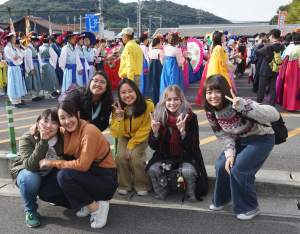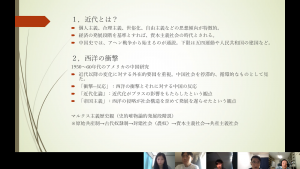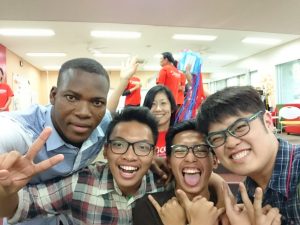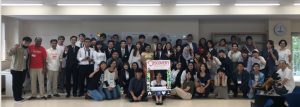【第1期卒業生の声】言語・国・学問分野を超えた学び
グローバル・ディスカバリー・プログラム (GDP)
Interview with the GDP First Graduating Class
ー October 2017 Batch ー

|
Five students reflected on the past four years spent at GDP, sharing their experiences, memories, and messages for their families and friends, faculty members, and fellow/future students |
Self-Introduction
Please tell us more about your background
| Kokoro: My name is Kokoro Sekiguchi. I was born in Japan and I moved to Hawaii in the U.S. when I was 12 years old. I went to middle school and high school in Hawaii, then I came to GDP. | 関口こころです。私は日本で生まれましたが、12歳のときにアメリカのハワイに引っ越しました。中学と高校はハワイで通いました。その後、GDPに来ました。 |
| Lu: My name is Lu Guanrong. I’m 22 years old. I come from a small town in China, called Changchun. Before coming to Okayama in 2017, I was just a high school student in China. | ルー・ガンロンです。22歳です。長春という中国の小さな町から来ました。2017年に岡山に来る前は、普通の中国の高校生でした。 |
| Nanda: My name is Nanda Rizky Illahi, known as Nanda for short, and I’m from Indonesia. I came here right after I graduated high school in Jakarta. | インドネシア出身のナンダ・リスキー・イライ(ナンダ)です。ジャカルタの高校を卒業してすぐにここに来ました。 |
| Stefanie: My name is Stefanie Petrovic. I’m from Canada. I am in Okayama University’s Global Discovery Program, majoring in sociology, which is in the culture cluster. | ステファニー・ペトロヴィッチです。カナダから来ました。私は岡山大学グローバル・ディスカバリー・プログラムのカルチャークラスターで社会学を専攻しています。 |
| Tan: My name is Tan Ju Sheng. People here know me as Mugi. I’m from Malaysia. Before I came to GDP, I was a pretty average, Chinese Malaysian. Before coming to Okayama, I was studying at a Japanese language school in Osaka. | タン・ジュ・シェンです。 ここではムギと呼ばれています。マレーシア出身です。GDPに来る前の私は、ごく普通の中国系マレーシア人でした。岡山に来る前は、大阪の日本語学校で勉強していました。 |
Interview
1. Why did you choose GDP? What was your goal?
| Kokoro: I chose GDP because its interdisciplinary program was really attractive to me. Also, I was really interested in learning nonprofit management, and GDP was the only program that had a nonprofit management major at undergraduate level in Japan. So that’s why I chose GDP. | GDPを選んだのは、学際的なプログラムが自分にとってとても魅力的だったからです。また、非営利団体のマネジメントを学びたいと思っていたのですが、日本の大学の学部レベルで非営利団体のマネジメントが専攻できるのはGDPだけでした。それがGDPを選んだ理由です。 |
| Nanda: I wasn’t sure what I wanted to major in at university in Indonesia. I was in the natural science track in high school, but I wasn’t sure if that’s what I wanted to do in the future and so GDP’s pretty open curriculum, having an interdisciplinary structure, really lured me in and it helped me decide that I wanted to explore as many disciplines as possible while I still can, while I’m young, while my mind is still kind of fresh, so that’s why I came here. | インドネシアの大学で何を専攻したいのかはっきりわかりませんでした。高校では自然科学系のコースにいましたが、それが将来やりたいことなのかわからなかったので、GDPのオープンなカリキュラムや学際的な学びのシステムにとても惹かれました。まだ若いうちに、頭がフレッシュなうちに、できるだけ多くの分野を探求しながら、自分がやりたいことを決めようと思い、ここに来ました。 |
| Tan: I was aiming for freedom and the vast diversity that GDP offers. After I came here, when I looked at the curriculum and the course list, I just decided that I wanted to learn as much as I can and take advantage of the freedom at GDP. | GDPの自由度と多様性の豊かなところが魅力でした。入学してから、カリキュラムやコースリストを見て、GDPのメリットである自由度を利用して、できる限り多くのことを学びたいと思いました。 |
| Stefanie: I entered GDP in the hopes of becoming a National Geographic photographer. I wanted to add an anthropological approach to my photography. And I looked up universities in Japan because I had already studied Japanese for seven years at that time and I thought, why not enroll in a program that teaches in English, but where I can still have the opportunity to learn Japanese, speak Japanese in the country, and then also combine anthropology with photography. | ナショナルジオグラフィックの写真家になることを目指して、GDPに入学しました。自分の写真に文化人類学の視点を加えたいと思いました。当時、私はすでに7年間日本語を勉強していたので、日本の大学を調べました。英語で学ぶプログラムに入れば、日本語を学べるし、日本語を話す機会もあるし、文化人類学と写真を組み合わせることもできるのではないかと考えました。 |
| Lu: The year that GDP was established, Okayama University made an agreement with my high school in China. GDP is an English Program but belongs to a Japanese University. So, it was quite attractive because I would have the command of three languages after graduation. My goal was to continue studying economics at the university. I wanted to make some friends from other countries and learn how to better get along well with other people and to enjoy our time in Japan. | 岡山大学が私の高校と提携した年にGDPが設立されました。日本の大学にある英語のプログラムなので、卒業後に3つの言語を使いこなすことができることが魅力的でした。私の目標は、大学で経済の勉強を続けることでした。そして、他の国の友達を作って、他の国の人とうまくやっていく方法を学んで、日本での生活を一緒に楽しみたいと思いました。 |
2. What are good points of GDP?
| Kokoro: I think it’s great that Japanese people and people from overseas can come together and study in one place. That is definitely one of the things that makes GDP special. I also think the fact that you can take classes in English at GDP and also classes in Japanese from other faculties is very appealing. I took classes from many faculties outside of GDP, such as the faculties of law, agriculture, letters, and education. | 日本人の学生と他の国から来た学生が一緒に学ぶところは GDPの1つの特徴でもあり、とてもいいところだと思います。それから、GDPで英語で学ぶ授業を取るだけではなくて、他学部で日本語で学ぶ授業を取れるのがとても魅力的でした。GDP以外に、法学部、農学部、文学部、教育学部など多くの学部の授業を受けました。 |
| Nanda: It’s not a closed program, so students can explore as many fields as they want. But, also, in terms of assignments, especially in the cultural cluster, we have a lot of research-based, writing-heavy assignments and I think those are helpful for students. At GDP, students aren’t just taught basic research methods, we are taught to know how to do research well, and how to deliver it in a way that is easy to read and understand. | 予め決められた形式がないので、学生は好きなだけ多くの分野を探求することができます。それに、特にカルチャークラスターでは研究に基づいたライティングに重きをおいた課題が多くて、学生にとって有益だと思います。GDPでは研究の仕方だけではなく、どうすればいい研究ができるか、そして研究成果をわかりやすく発表する方法まで指導してもらえます。 |
| Tan: Its strengths include the opportunity to experience different cultures and the amount of freedom students are given. If there is something you want to study or somewhere you want to go, it is all up to you. If you have the will to do something, you can make it happen. And I think that is the defining feature of GDP, it’s greatest strength. | 強みは文化の大体験、自由度だと思います。何を勉強したいか、どこに行きたいか、それは全部自分次第です。もし自分にそういう意欲があれば、何でも成し遂げられます。 それがGDPの1番の強みだと思います。 |
| Stefanie: It’s an interdisciplinary program. I took so many different classes from so many different, not only subjects, but clusters as well. And it really helped me realize what I want to do. | 学際的なプログラムであることだと思います。私はいろいろな科目だけでなく、異なるクラスターの授業もいろいろ履修していました。そのおかげで、自分のやりたいことに気づくことができました。 |
| Lu: I think the biggest strength is the process of input and output of knowledge between professors and students. Sometimes students form a circle and have a discussion. It is helpful because students from different cultural backgrounds can share their thoughts. Thanks to this new experience, we have the opportunity to think deeply about ourselves and our knowledge, which is an important process. | 一番の強みは、教授と学生の間の知識のインプットとアウトプットのプロセスだと思います。ときどき教室で学生が大きな円を作って座って、ディスカッションをすることもあります。異なる文化的背景を持った学生たちが考えを共有するのです。この新しい経験のおかげで、自分自身のことや知識について深く考える機会が持てました。それは大切なプロセスです。 |
3. What kind of students would you invite to GDP?
| Kokoro: This program is very appealing for students who can speak both English and Japanese and want to further improve both languages. A piece of advice for returnee students like me is that even if you only have a little interest in a certain class, or want to try speaking to someone in GDP, you shouldn’t be afraid to try taking a class at GDP. | 英語と日本語ができて、両言語の能力をさらに伸ばしたい学生にはとても魅力的だと思います。私のような帰国生の方へのアドバイスですが、少しでもGDPに興味がある授業とか、話してみたい人とかがいたら、 怖がらずにGDPで勉強してもらえたらいいなと思います。 |
| Nanda: I believe GDP can be a good fit for anyone who’s willing to put in the work. Even if you don’t have a set goal for your future, even if you don’t know what you want to do tomorrow, next year, in 10 years, you can always explore in GDP. I would encourage a lot of students. I think GDP is saying, “It’s OK”. It’s OK to explore as many interests as possible because it will only be a good thing for you. It will only benefit you. | GDPは勉強に努力を惜しまない人なら、だれにでもふさわしいところだと思います。将来の目標が決まっていなくても、明日、来年、10年後に何をしたいかわからなくても、GDPではいつでもそれを探すことができます。多くの学生を勇気づけるものだと思います。GDPが言っているのは、「いろいろなことに興味を持ってもいいんだよ」ということです。それはあなたのためになるだけですから。 |
| Tan: I don’t think there is only a certain type of student who should be invited into GDP, this big family. Instead, I think it is because we have so many different personalities, different characters, different people here, that we are so unique. I would be really happy if anyone with the willingness to try and achieve even the impossible could join. | GDPという大家族の一員になる学生に、特定のタイプがあるとは思いません。むしろ、様々な個性、性格、人がいるからこそ、このようにユニークなプログラムになっているのだと思います。不可能なことにもあきらめずに挑戦しようとする人が来てくれると、本当にうれしいです。 |
| Stefanie: Every student should be welcomed to this program. I think that those who are open to exploration, open to differences, are the ones who should be most interested in this program. | どんな学生でもこのプログラムに歓迎されると思います。なかでも、探求心や違いにオープンな人は、このプログラムに最も興味を持つと思います。 |
Watch the interview videos to learn more about each student
Precious Memories at GDP
What we saw, what we did, and what we learned




GDP Family Keeps Growing
We look forward to seeing you soon!

